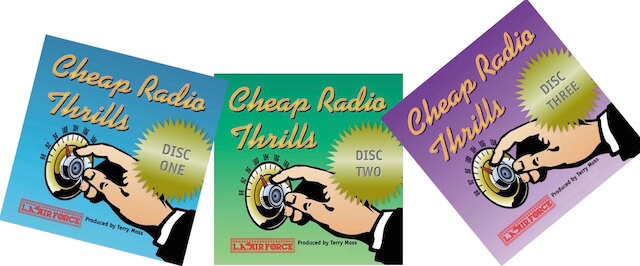This is the most popular thing I’ve ever written. Reprinting it is this blog’s New Year’s tradition.
Hope you enjoy it — complete with the original illustrations by Bobby Ocean.
A Reader Asks:
“Following your advice, we’ve looked for and actually hired part-timers from several unusual places. (One was a waiter our GM had while trying to pitch a potential client, another a door-to-door salesman who came into the station lobby.) But when they get on the air, they seem to clam up and become much more boring than they were before we hired them. When training ‘newly discovered’ part-timers, what are the most important things to start with?”
My Reply:
TELL THEM STORIES…
…about how & why you got into radio, who influenced you, your best radio moments, what you still hope to achieve.
War stories about broadcasting despite impossible conditions, accidentally locking yourself out of the studio, on-air flubs.
Stories about personal connections that have been made with listeners: The girl who called to request her late grandmother’s favorite song…The fan who sent you chocolate chip cookies on your birthday…The listener who berated you for mispronouncing the name of his favorite artist.
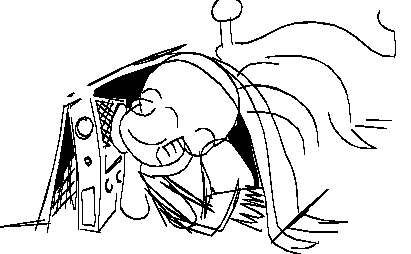 Stories about transistor radios under the bed covers and at the beach. Endless struggles to control the car radio buttons.
Stories about transistor radios under the bed covers and at the beach. Endless struggles to control the car radio buttons.
“Would you PLEASE turn that down”
and
“Wait, I want to hear this!”
Novelty records and girl groups and Motown and Stax and Cadence and Elvis from the waist up and hearing “I Want To Hold Your Hand” for the very first time.
Stories about lovesick teenagers dedicating songs back & forth to each other. About children turning on the radio before they’re even awake, feverishly hoping to hear those magic words from their local disc jockey: “No school, snow day….”
About loneliness and a solitary voice reaching out to you. About making a complete stranger laugh or reflect or remember. About baseball games from far away on car radios. About someone driving across town or across country, with only you and your radio brethren for company.
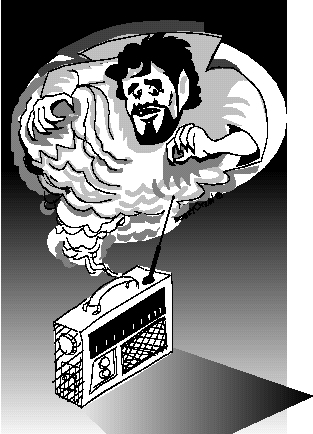
Stories about Larry Lujack and John Records Landecker and Robert W. and Wolfman Jack and Gary Owens and Dr. Don and Kenny Everett (ask someone from the UK about Kenny) and those crazy young jocks who brought American-style radio to Europe in the 1960s by taking to the seas in honest-to-God pirate radio ships (imagine broadcasting under the worst possible conditions; now imagine doing it while seasick).
Stories about bad news and everyone immediately turning on the radio. About sad news and where you were when you heard it. About practical jokes and misunderstandings and mild or wild revenge.
About getting fired, packing up the U-Haul, and being scared all over again.
Getting angry, getting older and “the good old days.”
Static-y voices criss-crossing in the night. Fifteen-hour air shifts, flaky jocks, disappearing engineers.
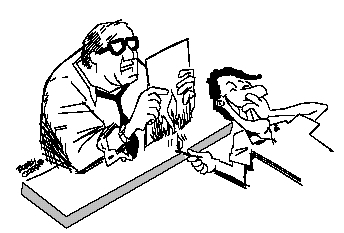
Stories about legendary radio people you almost met in an elevator at a convention. The major market PD who did you a favor; the request line caller you can’t forget. Practical jokes on the news guy, disappearing stationery, and a bedroom full of promo records that one day will be worth something.
Staying up late talking radio, swapping tapes, “borrowing” ideas, “embellishing” your ratings, deepening your voice, losing your voice, losing your place, losing your keys, losing your cool.
Wire service copy paper, 15-inch reels, pin-controlled automation. Caffeine addictions and junk food and whatever the station could trade for. Old friends, borrowed headphones, uncontrollable sleep-deprived laughter.
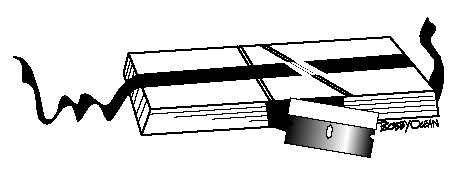 Razor blades, splicing tape, grease pencils. Draping the tape edit over your shoulders until it was safe to throw away.
Razor blades, splicing tape, grease pencils. Draping the tape edit over your shoulders until it was safe to throw away.
Cue tones, cue sheets, in cue, out of breath.
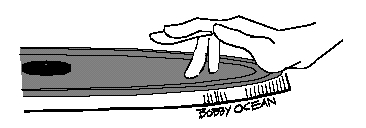
Slip-cueing, back-announcing, and hitting the post.
Egos, rivals, and friendships.
Imagination, excitement, Orson Welles and Jack Benny and Ma Perkins and Franklin D. Roosevelt and Arthur Godfrey and Don McNeil’s Breakfast Club.
Losing jobs, gaining weight, changing names.
“How do they do that?”
and
“Listen to this!”
Storz, McClendon, Drake…and Chuck Blore’s Color Radio. Play-by-play and blow-by-blow; sports scores and election returns and Number One on the charts this week.
7-7-7, First Ticket, Hooper, Pulse.
“You don’t look anything like you sound!”
“What am I doing with my life?”
and
7-day workweeks
and
“I can’t believe I get paid for this!”
Slow starting turntables, nickel on the tone-arm, the cart machine sticks.
Stories about hotlines, hot shots, skimmers, phantom cume, time checks, time warping, ratings, feelings, winning, showing off. T-shirts and coffee mugs and iridescent frisbees.
Billboard and Claude Hall and Cashbox and Record World and R&R and Bill Gavin’s green pages.
Floods and tornado watches and power outages and school lunch menus. Lost dogs, lost accounts, lost tempers.
Jiving, shouting, rhyming, whispering. Hiccup remedies, lemon ’n’ honey, and good old-fashioned adrenalin to save the day.
Embarrassed, elated, delighted. Hi-Low, Name It And Claim It, and Dollar-A-Holler. Playlists and station surveys and Good Guys. Q, Zoo, and Boss. Bob & Ray and Mike & Elaine and The Monitor Beacon.
Jingles, stickers, Chickenman and The Oidar Wavelength.
Silly stunts, intense rivalries…Passion.
B-Sides and label colors and songwriter credits. Favorite songs, favorite artists, favorite moments.
Newspaper wars, live remotes, and meter readings. Shouts, stingers, sweepers, stagers, stabs.
Make-goods, live tags, rip ’n’ read and backtiming to the news. Allan Freed and Dan Ingram and Cousin Brucie.
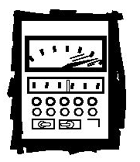
Beat the Bomb and Lucky Bucks and Battle of the Bands. Pinning the needle, pegging the meter, riding gain.
Feedback and wrapping the capstan and “Hold on a sec, I gotta go on the air…”
Sign on, sign off, warming up the filament and Compression, Compression, Compression!
Gates board with rotary pots; Automax and Volumemax. Intros, outros, ramps, talk-ups. False endings and records popping & skipping and carts jamming.
Philosophical Differences and late night resume photocopy sessions. Tight board, good pipes, will relocate.
The big break, bad luck, skip waves, skipping town with the air staff’s paychecks.
Cueing past the splice, heavy phones, cue burn. Solid Gold, Hot Nine at Nine, Hot 100. WABC and KHJ and KLIF and WOWO and WLS and making it to the big markets.
Friday night countdowns, Saturday Swap Shops, Sunday drag racing commercials, twin spins, doubleplays, triple shots and instant replays.
Romantic entanglements, broken hearts, big dreams, small wins, and “Garbage Mouth Leaves Cleveland.”
“NO ONE is to touch these carts! And that means YOU!”
“Were you listening when…?”
and
“What’d ya think?”
and
“You should have been there.”
Then explain to that new jock:
Now you are there.
What are you gonna do with it?
